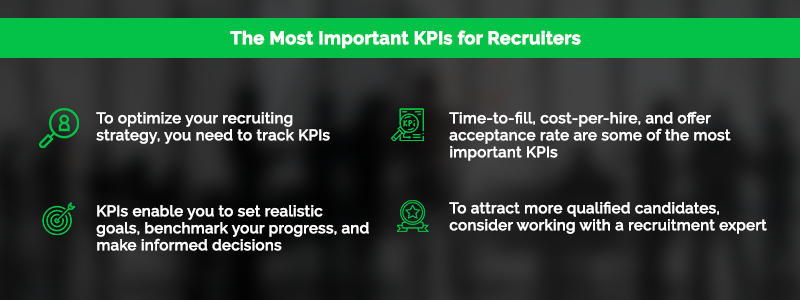As a recruiter, you should always take advantage of recruitment KPIs to measure the effectiveness of the recruiting process. But which KPIs should you track? Keep reading for details on the key KPIs for recruiters.

You’ve probably heard the term “KPI” being thrown around, but what does it mean? A key performance indicator (KPI) is a metric that helps you measure and track progress toward a specific goal. During recruitment, KPIs can track everything from the number of applications received to the quality of hires.
Yet, as a recruiter, you should be selective about the KPIs you monitor during the recruitment process. But before we explore these recruiting KPIs further, here is how tracking metrics can impact your organization.
Set realistic goals
Setting realistic goals can be difficult if you don’t pay attention to KPIs. Without a metric to monitor progress, you won’t know if you’re on track with your goals. KPIs can be helpful in this case, allowing you to set measurable goals and track them over time.
Measure progress over time
By tracking KPIs, you can better understand your recruiting process and identify areas that need improvement. For example, if you’re monitoring a recruitment process that should last for two months and notice that the number of applications starts to decline after two weeks, then something must be wrong. So, it only makes sense to revisit your job postings or marketing strategy.
Identify areas of improvement
Tracking KPIs means you can identify areas of the recruitment process that need attention. Picture yourself as a detective, and the KPIs are your clues. By piecing all of the clues together, you can see patterns and identify areas that need improvement.
Make data-driven decisions
Without data, making informed decisions about your recruiting process can be difficult. According to one study, 91% of executives agree that data-driven decision-making is critical to the success of their organization. KPIs provide the data you need to make informed decisions about your recruiting process.
Encourage accountability
Research shows that 65% of people are more likely to achieve goals when held accountable. KPIs work similarly. Tracking KPIs can keep you and your team responsible for reaching your recruiting goals. It also allows you to identify areas where someone may fall behind.
7 most crucial recruiter KPIs
So you can see how important KPIs are to maintaining an efficient recruiting process. But what are the most important recruiting KPIs? Here is a list of some of the 7 most essential KPIs for recruiters.
1. Quality of hires
It’s always good to take a step back and evaluate the performance of your hires. After all, the quality of your hires has a direct impact on the success of your business.
When recruiting, you should ask yourself, “Are we hiring the right people?” The quality of hires metric can help you answer this question. It allows you to track the performance of your hires over time and know whether or not you’re making good hiring decisions.
2. Time-to-fill
When recruiting, the time-to-fill metric can help you save time and money. Time-to-fill is the number of days it takes to fill a position after the job is posted. A shorter time-to-fill means you can get your new hires up-to-speed and get them productive.
Use the time-to-fill metric to track the average number of days it takes to fill a position. If you notice that the process is taking too long, it may be time to revisit your recruiting strategy.
3. Cost-Per-Hire
Recruiting can be expensive, especially on costs associated with job postings, background checks, and training. Though you may want to be efficient in your recruiting, you also don’t want to break the bank.
Keeping an eye on your cost-per-hire can help you strike the perfect balance. Cost-per-hire is the total cost of recruiting divided by the number of hires. Tracking this metric can help you optimize your recruiting process and save money.
4. Offer acceptance rate
You’ve found the perfect candidates and made them an offer. But what happens next?
The answer to this question is in the offer-acceptance-rate metric. This metric tracks the percentage of candidates who accept a job offer; a high acceptance rate is a good sign that you’re making competitive offers. If your offer acceptance rate is low, it may be time to revisit your salary ranges.
5. Application-to-interview ratio.
Nothing can be more frustrating than spending hours reviewing applications only to find that there are few qualified candidates. The application-to-interview ratio can help you avoid this frustration.
This metric tracks the number of applications you receive for each open position. A high ratio indicates that you’re getting a lot of applications. A low ratio may mean you must work on your job postings or improve your employer brand.
6. Hiring manager satisfaction
Your relationship with hiring managers is essential. After all, they are the ones who will be working with your new hires.
The hiring-manager-satisfaction metric allows you to track how hiring managers feel about your recruitment process. You can survey them after each hire and adjust your strategy based on their feedback.
7. Number of qualified candidates
Your recruitment process will always result in a pool of candidates – some qualified and some not. The number of qualified candidates metric allows you to track the ones who actually meet the job requirements.
This metric is important because it lets you see if your recruitment process is efficient. If you’re not attracting enough qualified candidates, you may need to adjust your job postings or target a different audience.
As you can see, with these metrics in hand, you can easily find ways to improve your recruitment process. But if you want to take things a step further, you might want to consult an expert.
Get assistance from a recruitment expert
Recruiting is vital to the success of any business. But it can be a time-consuming and expensive process. If you don’t have the internal resources to handle recruitment, consider working with a recruitment expert.
MetaGrowth is a full-service recruitment and consulting agency that can help you find the best candidates for your open positions. We specialize in finding top talent for startups and high-growth companies. Contact us today to learn more about our recruitment services.

